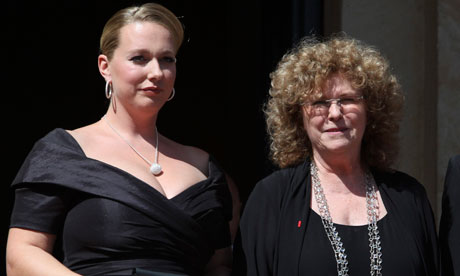
After a life spent chasing fame and other people's fortunes all over Europe, as well as fleeing from creditors and displeased governments, Richard Wagner chose a quiet corner of northern Bavaria in which to spend his autumn years. The house he built there he called Wahnfried, which translates as "peace from madness". Few houses have been worse named. Family feud has followed spat has followed controversy repeatedly for close on a century and a half.
The latest spat is more interesting than most and, though unlikely, could in principle lead to some of the family's hereditary madness finding rest at last. Katharina Wagner, the composer's great-granddaughter, who now runs the Bayreuth festival together with her half-sister Eva Wagner-Pasquier, has announced that the family must end its long and increasingly deafening silence over its historical associations with the Nazi party. Hitler's idolisation of Wagner is, of course, well documented. But the full extent of the composer's descendents' idolisation of Hitler is a somewhat murkier domain, largely because of the family's refusal to open the archives. In the interests of inaugurating a long overdue process of reckoning, Katharina and Eva have opened their share of the family's papers to public scrutiny. More significantly, given that the most sensitive documents all remain locked up and closely guarded by their cousin Amélie Hohmann, the pair are demanding that other branches of the family follow suit, threatening court action if necessary.
As Yevgeny Nitkin's recent withdrawal from the new production of Der Fliegender Holländer (which opened the festival last week) confirmed, his hand most likely forced by Katharina after historic footage revealed the singer sporting a swastika tattoo on his chest (he was in a Russian heavy metal band, which is an excuse, of sorts), the festival is still plagued by its guilty history. This year, though, perhaps as a precursor to her latest demands, Katharina Wagner has welcomed a travelling exhibition to this year's festival commemorating many of the Jewish musicians expelled from the Bayreuth rosters after the composer's daughter-in-law Winifred (an Englishwoman, by the way) moved to align the festival as closely as possible with the politics of her beloved "Uncle Wolf" (the name for Hitler used by her children, among them Wolfgang Wagner who ran the festival from 1951 until his death in 2008). Entitled "Silenced Voices", the exhibition will now remain on permanent display in the opera house foyer.
These developments are extremely welcome, not just for the Bayreuth festival itself, but also to begin to free Wagner's operas from endlessly distracting associations with the fascist regime which, half a century after his death, hijacked them and took them for their own. Wagner himself, an active participant in the anarcho-socialist Dresden Uprising of 1848, would have despised Hitler and his cronies. Though an appallingly manipulative egomaniac, the composer placed his life and art at the service of a deeply moral philosophy of redemption through human love. He would also have hated, and fought against, the regime's crippling sentimentalism and conservatism in cultural matters, fighting all his life for the innovation and development of the art so that they could echo the nobility and freedom of the human spirit.
It is easily argued, of course, that the antisemitism which Wagner expressed so virulently in his writings, and arguably in his operas, would have led to the composer finding sympathy with Hitler's policies for the purification of the Reich. But Wagner's antisemitism, though despicable, was of a different epoch and order to that of the Nazis.
It reflected prejudices and assumptions about racial and ethnic characteristics widespread not just in Germany but also in France, Italy and, with similarly deep roots, England. The German nation state was only a much longed-for idea for most of Wagner's life, only becoming political reality in 1871, 12 years before his death.
Wagner and many others believed that Jews, whether assimilated or not, could have no interest in contributing to the economic and cultural health of the nation. He was gravely mistaken, of course, and we now know the hideous outcome of such festering prejudices. But Wagner himself, for all his bluster and hyperbole, could never have guessed how far it would go.
Bayreuth celebrates the bicentenary of Richard Wagner's birth next year. Katharina's proposed legal action will probably take much longer than a year to unfold, and the resulting fallout, if successful, will take decades to be absorbed. But it is certainly a step in the right direction. A more decisive step would be for the family to withdraw from the running of the festival altogether. Wolfgang Wagner's stifling conservatism has not survived to the new order, but the continuing association of the festival with the Wagner dynasty only serves to strengthen the suspicion that Bayreuth is less a festival than a family shrine. Wagner himself realised better than any that art must constantly move forward if it is retain its power and meaning. He was right. If we want Wagner back, we need the Wagners to move aside.

